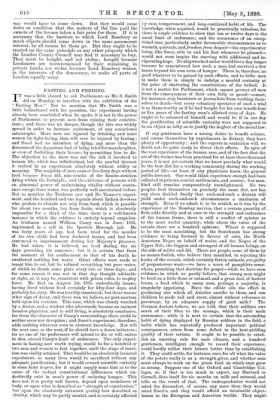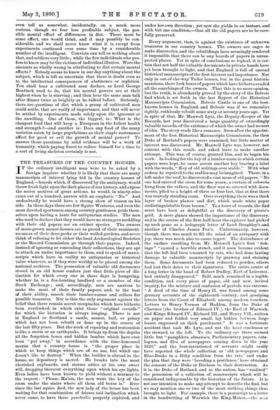FASTING- AND FEEDING.
IT was a little absurd to ask Parliament, as Mr. S. Smith did on Monday, to interfere with the exhibition of the " Fasting Man." Not to mention that Mr. Smith was a little behindhand with his question, the experiment having already been concluded when he spoke, it is not in the power of Parliament to prevent men from ruining their constitu- tions ; and there was no danger, though the idea was widely spread in order to increase excitement, of any sensational catastrophe. More men are injured by drinking, and more women by tight-lacing, than will ever be injured by fasting ; and Succi had no intention of dying, any more than the directors of the Aquarium had of being tried for manslaughter, or even of forfeiting their licence, by permitting him to die. The objection to the show was not the risk it involved to human life, which was infinitesimal, but the morbid interest it excited in an experiment absolutely without utility or meaning. The majority of men cannot live forty days without food because Succi did, nine-tenths of the famine-stricken dying within the fortnight ; and the existence of persons with an abnormal power of maintaining vitality without susten- ance except from water, was perfectly well ascertained before. Not to mention the Toulouse case and Dr. Tanner's experi- ment, and the hundred and one legends about Indian devotees who profess to abstain not only from food, which is possible for about two months, but from fluids, which is absolutely impossible for a third of the time, there is a well-known instance in which the evidence is entirely beyond suspicion. An Irishman named William Casey was in June, 1835, imprisoned in a cell in the Ipswich Borough jail. He was forty years of age, had been tried for the murder of his own child, had been declared insane, and had been sentenced to imprisonment during her Majesty's pleasure. He had taken, it is believed, no food during the six days preceding his sentence ; but it is certain that from the moment of his confinement to that of his death he swallowed nothing but water. Great efforts were made to tempt him to eat, but he refused everything but pure water, of which he drank some pints every two or three days ; and for some reason it was not in that day thought advisable or right, or, it may be, consistent with prison rules, to employ force. He died on August 1st, 1835, undoubtedly insane, having lived without food certainly for fifty-four days, and probably for sixty. He was terribly emaciated; but there was no other sign of decay, and there was, we believe, no post-mortem held upon his remains. This case, which was closely watched by a doctor, and a student who afterwards became an eminent London physician, and is still living, is absolutely conclusive, for from the character of Casey's surroundings there could be neither error nor deception ; and Succi's experiment, therefore, adds nothing whatever even to abstract knowledge. Nor will the next case, or the next, if he should have a dozen imitators ; for no one of the performers will intend to die, or will, unless he dies, exceed Casey's limit of endurance. The only experi- ment in fasting now worth trying, would be for a hundred or two men and women to fast together, until the stage of inani- tion was visibly attained. That would be an absolutely immoral experiment, as many lives would be sacrificed without any adequate justification; but it would reward scientific curiosity in some faint degree, for it might supply some hint as to the cause of the radical constitutional differences which un- doubtedly exist in men's power of enduring hunger. This does not, it is pretty well known, depend upon soundness of body, or upon what is described as " strength of constitution," but upon the absolutely unknown quality best described as vitality, which may be partly mental, and is certainly affected by race, temperament, and long-continued habit of life. The knowledge, when acquired, would be practically valueless, for there is ample evidence to show that ten or twelve days is the usual limit of endurance; and the occurrence of an excep- tional case, particularly under favourable circumstances as to warmth, quietude, and freedom from despair—the experimenter being, like Succi, able to end his fast whenever he pleased— would not even inspire the starving with additional and in- vigorating hope. No shipwrecked sailor would live a day longer because he remembered how such a man had survived a few hours beyond his own term of hunger. There is, therefore, no good whatever to be gained by such efforts, and to bribe men to make them is simply to indulge a morbid curiosity at the price of shattering the constitutions of the bribed. It is not a matter for Parliament, which cannot protect all men from the consequences of their own folly or greed—cannot, for instance, stop barristers or journalists from working them- selves to death—but every voluntary spectator of such a trial is as blameworthy as if he had bought for his own benefit four or five years of the fasting man's allotted term of days. He ought to be ashamed of himself, and would be if in our day the gratification of scientific curiosity were not supposed to be an object so lofty as to justify the neglect of the moral law.
If any gentlemen have a strong desire to benefit science, and amuse themselves by experiments in dietary, they have plenty of opportunity ; and the experts in sanitation will, we doubt not, be quite ready to direct their efforts. In spite of the vast experience of the human race, and of the fact that the art of the trainer has been practised for at least three thousand years, it is not yet certain that we know precisely what would be the best diet for a working community during the working period of life,—at least, if any physicians know, the general public does not. One would think experience enough had been collected in prisons, convict settlements, and armies ; but man- kind still remains comparatively unenlightened. No two peoples feed themselves on precisely the same diet, nor has any class decided finally that such-and-such a dietary will yield under such-and-such circumstances a maximum of strength. Even if we admit it to be settled, as it was by the experience of the Bombay navvies, that a certain quantity -of. flesh adds directly and at once to the strength and endurance of the human frame, there is still a conflict of opinion as to the most useful quantity; while about the value of the cereals there are a hundred opinions. Wheat is supposed to be the most nourishing, but the Scotchman has strong evidence to bring forward in favour of oats, the North American Negro on behalf of maize, and the Negro of the Upper Nile, the biggest and strongest of all human beings, on the side of millet and dal. There are people, some of them by no means foolish, who believe that mankind, in rejecting the husks of the cereals, which certainly fatten animals, are guilty of preposterous waste—we have a score of pamphlets some- where, preaching that doctrine for gospel—while we have seen evidence, in which we partly believe, that strong men might be bred on a little flour or oatmeal, and a great deal of haricot beans, a food which to many men, perhaps a majority, is singularly appetising. Have the edible oils the effect in producing size which all Asiatics ascribe to them, and can children be made tall and stout, almost without reference to parentage, by an adequate supply of good milk P The German doctors believe, we are told, that their soldiers owe much of their fibre to the sausage, which is their main sustenance ; while it is next to certain that the astounding habit of dying displayed by Russian soldiers in the field, a habit which has repeatedly produced important political consequences, arises from some defect in the heat-yielding quality of their rations. It ought to be possible to estab- lish an unerring rale for each climate, and a hundred gentlemen, intelligent enough to record their experience, could hardly utilise their leisure better than by establishing it. They could settle, for instance, once for all what the value of the potato really is as a strength-giver, and whether man must always be weak on the green food on which oxen grow so strong. Suppose one of the Oxford and Cambridge Col- leges, or, if that is too much to expect, say Harvard or Cornell, diets itself for six months on milk and oatmeal, and tells us the result of that. The undergraduates would not mind the discomfort, of course, any more than they would mind Succi's, and they would afford an invaluable object- lesson to the European and American worlds. They might
even tell us somewhat, incidentally, on a much, more curious, though we fear less profitable subject, the pos- sible mental effect of differences in diet. There must be some effect, one would think, and it may possibly be con- siderable, and we shall never know what it is, except from experiments continued over some time by a considerable number of the intelligent. Convicts can tell us nothing about that, and soldiers very little ; while the few individuals who pro- fess to know may be the victims of individual illusion. Were the ancients so wholly wrong in attributing to diet certain mental effects P Nobody seems to know in our day anything about the subject, which is left so uncertain that there is doubt even as to the intellectual consequences of abstinence or repletion. You shall hear a cultivated man declare, as Lord George Bentinek used to do, that his mental powers are at their highest when he is starving ; and then hear the same man talk after dinner twice as brightly as he talked before. Seriously, there are questions of diet which a group of cultivated men could settle, that are really of importance, and that will never be settled by experiments made solely upon the ignorant or the unwilling. One of them, the biggest, is : What is the cheapest food that will keep a European in the fullest health and strength P—and another is : Does any food of the many varieties eaten by large populations as their staple sustenance affect for good or evil the growth of mental power P To answer those questions by solid evidence will be a work of humanity, which paying Sued to reduce himself for a time to a sort of living skeleton certainly is not.







































 Previous page
Previous page